
JOURNAL OF PHILOSOPHY
Scope & Guideline
Advancing the frontiers of philosophical thought.
Introduction
Aims and Scopes
- Epistemology and Knowledge:
The journal frequently addresses topics related to epistemic justification, belief formation, and the nature of knowledge, exploring fundamental questions about what it means to know something and how we acquire knowledge. - Ethics and Morality:
A significant portion of the journal's articles delve into ethical theories, moral reasoning, and the implications of moral beliefs, often challenging traditional notions of right and wrong and examining contemporary moral dilemmas. - Metaphysics and Ontology:
Metaphysical inquiries are prominent in the journal, with papers exploring concepts such as existence, identity, causation, and the nature of reality, reflecting a commitment to understanding the foundational aspects of philosophical inquiry. - Philosophy of Mind and Consciousness:
The journal includes discussions on consciousness, mental states, and the philosophy of mind, addressing issues like the nature of self-awareness, the relationship between mind and body, and the implications of cognitive science for philosophical theories. - Political Philosophy and Social Theory:
Political and social philosophy are core areas of focus, with articles examining concepts such as justice, rights, and the role of ideology in shaping societal structures, thereby contributing to debates on governance and ethics in public life. - Philosophical Methodology:
The journal promotes discussions on the methods and practices of philosophical inquiry, including debates on practical reasoning, argumentation, and the implications of various philosophical frameworks for understanding complex issues.
Trending and Emerging
- Intersectionality and Social Justice:
There is an increasing emphasis on intersectionality and social justice issues, as seen in discussions that analyze power dynamics, privilege, and systemic inequality, reflecting a growing awareness of the complexities of identity and ethics in social contexts. - Environmental Philosophy:
Emerging themes in environmental philosophy are becoming more prominent, with articles exploring ethical implications of climate change, ecological justice, and the moral responsibilities of individuals and societies towards the environment. - Neuroscience and Philosophy:
The intersection of neuroscience and philosophy is gaining traction, with papers investigating the implications of neuroscientific findings for traditional philosophical questions about consciousness, agency, and moral responsibility. - Digital Ethics and Technology:
As technology continues to evolve, there is a notable increase in discussions surrounding digital ethics, artificial intelligence, and the moral implications of technological advancements, indicating a response to contemporary societal challenges. - Pragmatism and Applied Philosophy:
A trend towards pragmatism and applied philosophy is evident, with a growing number of articles focusing on practical applications of philosophical theories to real-world problems, suggesting a shift towards more actionable philosophical inquiry.
Declining or Waning
- Analytic vs. Continental Philosophy:
The journal has seen a reduction in papers that explicitly engage with the divide between analytic and continental traditions. This decline suggests a potential shift towards more integrative approaches rather than strict adherence to these established categories. - Historical Philosophy:
There is a noticeable decrease in articles focusing on historical figures or traditional philosophical texts. This trend may indicate a growing preference for contemporary issues and problems rather than historical analysis. - Formal Logic and Mathematical Philosophy:
Papers dedicated to formal logic and mathematical approaches to philosophical problems are less frequent. This change could reflect a broader trend in philosophy moving away from formalism towards more applied and interdisciplinary methods. - Philosophy of Science:
The focus on the philosophy of science appears to be waning, with fewer articles addressing scientific methodology, theory construction, and the implications of scientific developments for philosophical inquiry.
Similar Journals

Filozofia Nauki
Empowering Scholars Through Open Access KnowledgeFilozofia Nauki is a distinguished academic journal published by the Institute of Philosophy at Warsaw University, Poland, with a dedicated focus on the interdisciplinary realms of Philosophy and the History and Philosophy of Science. Since its transition to Open Access in 2020, the journal has broadened its reach, allowing scholars worldwide to engage with its content without barriers. The journal boasts an important standing in the academic community, currently ranked Q2 in Philosophy and Q3 in History and Philosophy of Science as of 2023, reflecting its impact and relevance. With an H-Index indicating its citation influence, the journal aims to foster critical discourse, sharing innovative research and ideas that push the boundaries of knowledge in these fields. Its Scopus rankings, with a percentile of 58th in Philosophy and 41st in the History and Philosophy of Science, further highlight its growing prestige. As it continues to publish cutting-edge research, Filozofia Nauki stands as a vital resource for researchers, professionals, and students committed to exploring the philosophical dimensions of scientific inquiry, ensuring a robust forum for discussion and discovery.
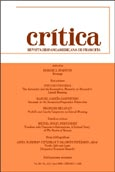
CRITICA-REVISTA HISPANOAMERICANA DE FILOSOFIA
Engaging Minds, Shaping DiscourseCRITICA-REVISTA HISPANOAMERICANA DE FILOSOFIA, published by CRITICA in Mexico, is a prominent peer-reviewed journal established in 1977 that has continually contributed to the field of philosophy in the Hispanic world. With an ISSN of 0011-1503 and an E-ISSN of 1870-4905, this journal plays a significant role in disseminating philosophical discourse, engaging both established and emerging scholars. It holds a Q3 ranking in the field of Philosophy according to the 2023 Category Quartiles and is ranked 305 out of 806 in the Scopus Arts and Humanities: Philosophy category, placing it in the 62nd percentile. Although it does not offer an open access option, its commitment to quality and relevance makes it an essential resource for researchers and students eager to explore contemporary philosophical issues and debates. The journal remains a vital platform for intellectual exchange, encouraging diverse perspectives that enrich the landscape of philosophical inquiry.

Acta Philosophica
Navigating the Landscape of Philosophical ThoughtActa Philosophica is a prestigious academic journal dedicated to the exploration and analysis of philosophical thought. Published by Fabrizio Serra Editore in Italy, this journal serves as a vital platform for scholars, presenting rigorous research that contributes to the field of philosophy. With an ISSN of 1121-2179 and an E-ISSN of 1825-6562, Acta Philosophica is indexed in prestigious databases, enhancing its visibility and impact within the academic community. Active since 2011, this journal has emerged as a significant player in the discipline, currently positioned in the Q3 quartile for Philosophy in 2023 and ranked #557 among 806 journals in the Arts and Humanities category on Scopus, placing it in the 30th percentile. Researchers and students alike will find valuable insights within its pages, as it covers a broad spectrum of philosophical inquiries. Although not an open-access journal, its rich content makes it essential reading for anyone invested in advancing philosophical discourse.
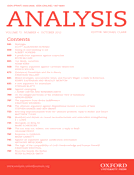
ANALYSIS
Unraveling the Complexities of PhilosophyANALYSIS, an esteemed journal published by Oxford University Press, ranks in the top quartile (Q1) within the field of Philosophy, showcasing its significance in disseminating cutting-edge research and critical studies since its inception in 1933. With an ISSN of 0003-2638 and an E-ISSN of 1467-8284, the journal has maintained a dedicated readership across various converged publications from 1933 to the present. Based in the United Kingdom, ANALYSIS is committed to exploring foundational philosophical questions and advancing theoretical dialogue in both traditional and contemporary contexts. The journal is recognized for its rigorous peer-review process and is indexed in Scopus, reflecting its solid standing at rank #178/806 in the Arts and Humanities domain, encompassing the 77th percentile of its category. Although currently not available as an open-access journal, ANALYSIS provides invaluable insights and a platform for philosophical discourse that appeals to scholars, professionals, and students alike, fostering a deeper understanding of the complexities in the world of philosophy.

REVUE INTERNATIONALE DE PHILOSOPHIE
Fostering Rigorous Discourse in PhilosophyREVUE INTERNATIONALE DE PHILOSOPHIE, published by REVUE INT PHILOSOPHIE, is a prestigious journal in the field of philosophy, based in Belgium. With an ISSN of 0048-8143 and an E-ISSN of 2033-0138, this journal has been a vital platform for philosophical discourse since its inception in 1983, successfully evolving through various phases until 2024. Despite currently being positioned in the Q4 category of Philosophy according to the 2023 rankings, it serves as an important venue for scholars and students alike, allowing for a diverse exploration of philosophical thought. Although it is not an Open Access publication, the journal fosters a rich environment for rigorous scholarly research and debate. By presenting articles that challenge and inspire, REVUE INTERNATIONALE DE PHILOSOPHIE ensures that it remains an essential resource for anyone engaged in philosophical inquiry.
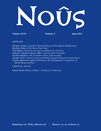
NOUS
Elevating critical thought to new heights.NOUS is a prestigious academic journal published by WILEY, specializing in the field of Philosophy. Since its inception in 1989, it has maintained a strong reputation within the philosophical community, currently earning a remarkable position in the top quartile (Q1) of its category as of 2023. With an impressive Scopus ranking of #22 out of 806 in the Arts and Humanities – Philosophy category, and achieving a 97th percentile, NOUS serves as a pivotal platform for scholarly discourse, innovative research, and critical thinking. The journal prioritizes high-quality articles that contribute significantly to various philosophical debates, thereby attracting both established and emerging scholars. Although it does not offer an open access option, NOUS is a crucial resource for anyone engaged in serious philosophical inquiry and is dedicated to advancing knowledge and understanding in this rich field.

PHILOSOPHICAL STUDIES
Exploring the Depths of Critical InquiryPhilosophical Studies, published by Springer, is a prestigious peer-reviewed journal that stands at the forefront of philosophical discourse since its inception in 1950. With ISSN 0031-8116 and E-ISSN 1573-0883, this journal has firmly established itself as a critical platform for disseminating high-quality research in philosophy, positioned in the Q1 category for Philosophy with an impressive Scopus rank of #73 out of 806, placing it in the 90th percentile of its field. Although it does not offer Open Access, the journal’s rigorous selection process ensures that only the most relevant and impactful studies are published, making it an invaluable resource for philosophers, academics, and students alike. With a commitment to advancing philosophical inquiry and fostering a vibrant scholarly community, Philosophical Studies continues to attract contributions that challenge prevailing paradigms and explore new dimensions in philosophical thought. The journal's scope encompasses a wide array of topics within philosophy, encouraging interdisciplinary engagement and dialogue.
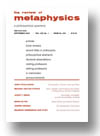
REVIEW OF METAPHYSICS
Elevating philosophical studies with timeless insights.REVIEW OF METAPHYSICS is a distinguished journal published by PHILOSOPHY EDUCATION SOC, INC, dedicated to advancing scholarly discourse in the field of philosophy. With an ISSN of 0034-6632 and an E-ISSN of 2154-1302, this journal has been a crucial platform for philosophical inquiry since its inception in 1975, converging its rich content from 1992 and continuously serving the academic community up to 2022. Based in the United States, specifically at 223 Aquinas Hall, Catholic University America, Washington, DC, it has secured a reputation for quality, reflected in its placement within the Q3 category of the 2023 Philosophy rankings, and a Scopus rank of 367 out of 806 in Arts and Humanities, placing it in the 54th percentile. Although it does not offer open access options, the REVIEW OF METAPHYSICS remains an essential resource for philosophers and students alike, fostering critical perspectives on metaphysical issues, and thereby contributing significantly to the advancement of philosophical studies.

AMERICAN PHILOSOPHICAL QUARTERLY
Fostering Scholarly Dialogue for Over Four DecadesAMERICAN PHILOSOPHICAL QUARTERLY, published by University of Illinois Press, stands as a premier venue for scholarly discourse in philosophy, boasting an impressive Q1 ranking in its field and positioning itself within the top 19% of its category according to Scopus. With a long-standing history since its inception in 1973, the journal has become influential in shaping contemporary philosophical thought and debate. As a non-open access publication, it provides rigorous peer-reviewed articles that cover a wide range of philosophical topics, catering to the needs of researchers, professionals, and students alike. The journal’s commitment to intellectual excellence and critical inquiry makes it an essential resource for anyone seeking to engage deeply with philosophical issues today.
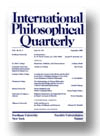
INTERNATIONAL PHILOSOPHICAL QUARTERLY
Unraveling Contemporary Philosophical ChallengesINTERNATIONAL PHILOSOPHICAL QUARTERLY, published by the PHILOSOPHY DOCUMENTATION CENTER, stands as a vital resource for scholars and practitioners engaged in philosophical inquiry. With an ISSN of 0019-0365 and an E-ISSN of 2153-8077, this esteemed journal has published thought-provoking discussions and analyses in philosophy since its inception in 1974. The journal is housed in the United States at PO BOX 7147, CHARLOTTESVILLE, VA 22906-7147, and has shown a commitment to advancing philosophical debates across its converged years from 1974 to 2023. Recognized with a Q3 rating in the philosophy category for 2023, it ranks 511 out of 806 within Scopus, positioning it within the 36th percentile of its peers. Although not an open-access publication, it continues to offer critical insights that foster scholarly dialogue and research within the field. This journal is especially pertinent to researchers, professionals, and students who seek to deepen their understanding of contemporary philosophical issues and engage with a diverse array of philosophical perspectives.